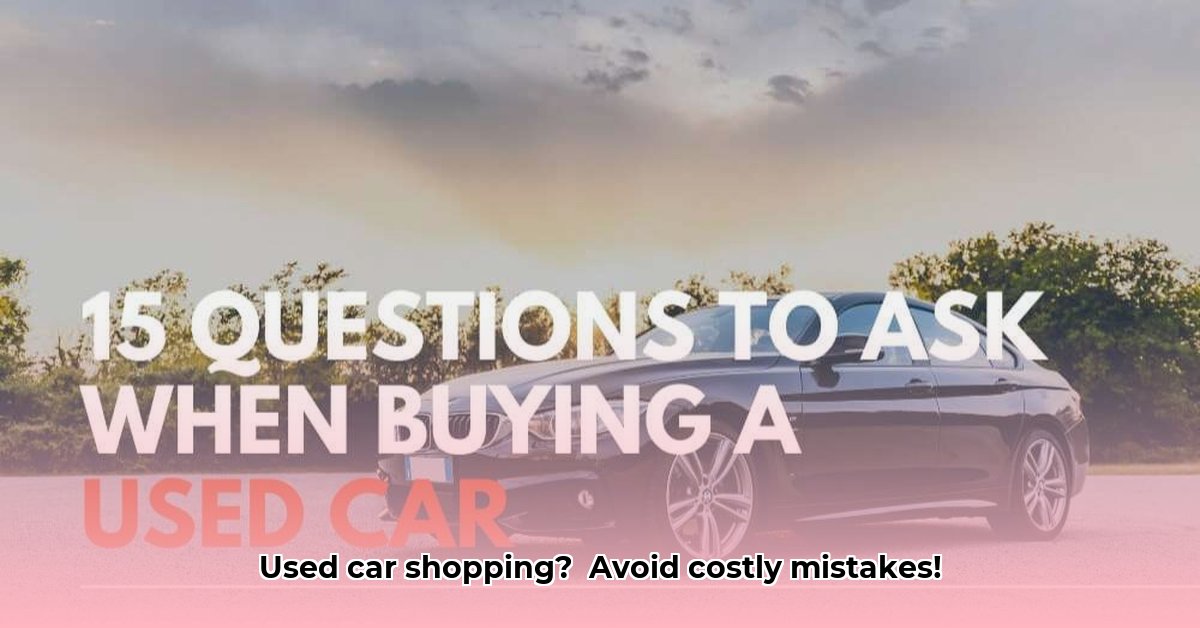
Buying a used car can be daunting, but asking the right questions can save you from costly mistakes and ensure you get a reliable vehicle. This guide provides a structured approach, empowering you to make an informed decision. For a legally sound transaction, consider using a car sale bill of sale.
Digging into the Car's Mechanical History: More Than Just a Pretty Face
Show Me the Maintenance Records: Demand to see complete maintenance records. Consistent service history indicates proper care. Gaps are a red flag. Were oil changes and tune-ups done on schedule?
Any Major Repairs? Has the car undergone any significant repairs? If so, what was done, when, and by whom? Examine the car's body for signs of accidents or repairs.
What Fluids Were Used? The consistent use of quality oil, transmission fluid, and coolant suggests proper maintenance.
Timing Belt/Chain Condition: A neglected timing belt (or chain) can cause catastrophic engine failure. Inquire about its replacement history.
Mechanic Visit Frequency: How often did the previous owner take the car for service? Regular checkups are a positive sign.
Dashboard Warning Lights: Are there any warning lights on the dashboard? Get a detailed explanation of any past occurrences and how they were resolved.
Pre-Purchase Inspection: Before committing, take the car to your trusted mechanic for an independent inspection. This can protect you from undisclosed issues.
Tire Condition: Inspect the tires for wear and tear. Worn tires are a safety hazard and an expensive replacement. Don’t forget the spare!
Undisclosed Mechanical Issues? Directly ask the seller about any known mechanical problems. Honesty here is paramount. A reliable seller will be transparent.
Uncovering the Vehicle's Past: A Clean History is Golden
Vehicle History Report: Request a Carfax or AutoCheck report to review the car's history for accidents, title issues, or other potential problems. This is a non-negotiable step.
Accident History: Inquire about any accidents, even minor ones, as they can indicate hidden damage. Carefully examine the car for signs of repairs.
Number of Previous Owners: Fewer owners often—but not always—suggests better care. High turnover might indicate underlying problems.
Reason for Selling: Understanding the seller’s motivation can provide valuable insights. A rushed sale could signal hidden issues.
The Business End: Protecting Your Wallet
Price and Negotiation: Research the car's market value using online tools like Kelley Blue Book. This provides a solid foundation for negotiation.
What's Included?: Clearly define what’s included in the sale—spare tire, floor mats, owner’s manuals.
Taxes and Fees: Calculate all taxes, registration fees, and other related costs to avoid surprises.
Clean Title: Verify that the title is clear of liens or other issues. This is a crucial legal protection.
Warranty or Return Policy: Inquire about any existing warranty or return policy. This offers a degree of protection against unforeseen problems.
Ownership Transfer Process: Ensure a smooth and efficient transfer of ownership. Confirm the seller's preparedness.
Loan Status: Confirm that all loan payments are up-to-date to avoid future complications.
The Test Drive and Final Checks: Putting It All Together
Test Drive: Take a thorough test drive on various road types and speeds. Listen for unusual noises. Pay attention to acceleration, braking and steering responsibilities.
Driving Experience: Assess the car's overall handling and performance. Does anything feel unusual or problematic?
Fuel Efficiency: Monitor the fuel gauge during your test drive to get a sense of the car's fuel economy.
Functionality Check: Test all features—air conditioning, radio, power windows—and note any malfunctions.
Sale Finalization: Clearly define the sale terms—cash, financing—and obtain all agreements in writing.
This comprehensive list will equip you to confidently navigate the used car market. Remember, thorough research and due diligence are your best tools for avoiding costly mistakes.